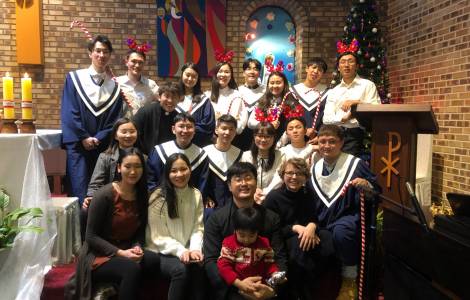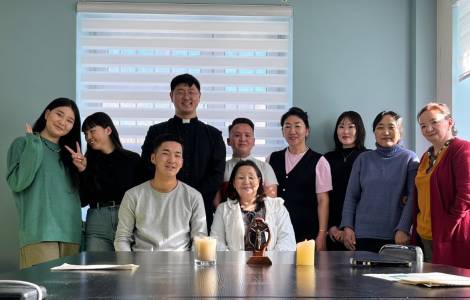by Paolo Affatato
Ulaan Baatar (Agenzia Fides) - "The Mongolian Church is a very young and small Church. This is an absolutely necessary condition for God's will to be done here. I believe that this is a condition in which God can show very clearly what His will is. When we pray the Lord's Prayer, we say: 'Thy will be done on earth as it is in heaven', and we pray that it be done in Mongolia too": With these words the Korean missionary Father Peter Hong, currently parish priest in Ulaan Baatar, outlines the spiritual attitude that characterizes his missionary service in Mongolia. Father Peter Hong, a 40-year-old priest from the Korean Diocese of Dajeon, was sent to Mongolia five years ago as a "fidei donum" priest, as part of a 25-year missionary collaboration between the churches of Mongolia and South Korea. The proximity is expressed on the one hand by the sending of "fidei donum" priests (currently there are three from the diocese of Daejon) and missionaries, and on the other hand by the fact that Mongolian seminarians are given the opportunity to complete their university studies in South Korea.
The priest told Fides: "We live the grace to be small and Pope Francis' apostolic journey is a good opportunity to confirm this. The Church of Mongolia is very small, but the Pope comes precisely because of the 1,500 faithful here to Mongolia. This reminds us of the incarnation of Jesus Christ, who bared himself and made himself small and came into this world to save mankind," the missionary said. "Jesus is always with the poor, the little, the suffering, so living and serving here in Mongolia is a sure way to follow Jesus".
Father Peter Hong remembers his friend and "fidei donum" priest, Father Stephen Kim Seong-Hyeon, who died on May 26 in Mongolia after 23 years of service in the mission (see Fides, 26/5/2023).
"I share what Stephen always said: whether it's in Korea, in Mongolia, or anywhere in the world, we do missionary work because we proclaim and bear witness to the Gospel. I do not believe that the pastoral ministry that the Lord is leading us to do called here in Mongolia is something special: It is a ministry for the kingdom of God, like everywhere else in the world. But Mongolia is something special for me, it is the place where the Lord took me today, in the here and now. This is where we live and pass on his love".
The Church in Mongolia and the Church in South Korea are "sister churches" that maintain a strong bond of closeness. At present, 23 of the 77 missionaries (priests, nuns and lay people) working in Mongolia and belonging to various religious congregations are from South Korea. A special bond of spiritual closeness exists with the Korean Diocese of Daejeon (with the three "fidei donum" priests currently present), where then Bishop Lazarus You Heung-sik (now Cardinal and Prefect of the Vatican Congregation for the Clergy) encouraged the choice to regularly send the fifth year seminarians of his diocese on missionary trips to Mongolia.
The close ties between the churches continued through the sending of missionaries and the support of pastoral services, social work, schools and studies. Both the first Mongolian priest,
Fr. Joseph Enkh-Baatar, and Fr. Peter Sanjajav, the second native priest, completed their theological studies in Korea and both remember the valuable testimony of Fr Stephen Kim Seong-Hyeon, who arrived in Mongolia in 2002 and later became parish priest of St. Peter and Paul Cathedral and vicar general of Ulaan Baatar Apostolic Prefecture.
The Apostolic Prefecture of Ulaanbaatar and the Korean Archdiocese of Seoul signed a joint "Memorandum of Understanding" for missionary cooperation in Ulaanbaatar in 2016. The document stipulates that the Korean Archdiocese's "Catholic Educational Foundation" will cooperate in evangelization and the formation of priests through financial support, including hosting seminarians from Mongolia at the Seoul Theological Seminary. In addition, a partnership between the “St. Mary's Hospital in Seoul and Mongolia's First Central Hospital to provide state-of-the-art medical care, surgical techniques and therapies.
In recent years there have also been fruitful spiritual and pastoral exchanges through collaboration with the Focolare Movement: several Korean families have come to Mongolia to share the Gospel message and their testimony of faith with Mongolian Catholic families. Some Korean couples visit parishes and meet with local families. During the encounters, they read the Gospel and talk about how it can be lived in daily family life: a path that represents an opportunity for spiritual growth for baptized Mongolians.
The ties between the communities of Mongolia and Korea are based on ethnic, linguistic and cultural similarities, which are now also reflected on an economic level, such as the presence of numerous Mongolian nationals in South Korea (more than 30,000, the largest group abroad) and vice versa ( 3,500 South Koreans in Mongolia) thanks to a 2006 bilateral agreement that allows for labor exchanges. Remittances from Mongolians working in South Korea have become an important source of income for the Central Asian country.
Mongols and Koreans are ethnically related peoples: in the 13th century, the Mongols invaded China and the Korean peninsula, leaving common language and culture; A special legacy that has been preserved over the centuries are the herds of wild horses on the South Korean island of Cheju, which are still called "Mongolians" there today.
Today, Korean culture (food, traditions, pop music, TV series) is widespread in Mongolia; given the similar ethnic characteristics, South Korean companies don't bother to recreate video footage or posters featuring local models in advertising campaigns in Mongolia.
In 2021, Ulaan Baatar and Seoul established a partnership to strengthen economic ties, particularly in the fields of mining, tourism and urban development. Trade, tourism, cultural exchange and educational cooperation with South Korea overlap and influence Mongolian society. At the recent political meetings, plans were made to increase investments and deepen cultural and educational ties, which should have a positive impact on Mongolia's future. (Agenzia Fides, 31/8/2023)

